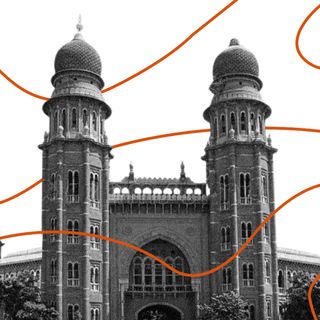
Karnataka Schools May Replace Eggs in Mid‑Day Meals Due to Religious Opposition
The politics around inclusion of only “vegetarian” options reveals rampant caste-based anxiety among communities.

The Karnataka government recently announced eggs will be included in mid-day meals across several districts in the state to battle malnourishment. But the decision has resulted in backlash from religious groups — so much so, that the government has reportedly begun looking for alternatives to eggs.
Seers from the Lingayat and Jain communities have fiercely opposed the decision, claiming this change will violate religious beliefs. Amid this opposition, “the state government is exploring other options to provide protein-rich food to children as an alternative to egg,” B.C. Nagesh, Primary and Secondary Education Minister, told The Indian Express.
Mid-day meals have long been a way to provide nutritional support to growing children — especially those who belong to socio-economically disadvantaged backgrounds. At present, the pandemic has worsened India’s existing malnutrition problem, both World Economic Forum and UNICEF believe.
“The decision to include boiled eggs in the mid-day meal scheme was based on surveys and reports from the Centre that indicated malnourishment persisting among children… We also had inputs from experts that egg was the best-known single source of protein. This led to its inclusion in the mid-day meal scheme to help children combat malnutrition,” Nagesh said.
Reportedly, a series of governments in Karnataka have tried to include eggs in the mid-day meals — for, at least, a decade. Yet, opposition from different religious groups ensured their endeavors never saw the light of day — despite there being no coercion on vegetarian students to consume eggs.
But was the opposition really ever hinged on the freedom to choose one eats, or has its goal been to force a homogenous idea of vegetarianism on everyone — without taking their choices into account? Students who don’t choose to opt for eggs in their meals can choose to have bananas instead. Now, whether religious groups are worried vegetarian students will be sullied by the presence of eggs in their vicinity, or will be tempted to choose eggs over their religion — is anyone’s guess.
Related on The Swaddle:
Harvard University Recognizes Caste‑Based Discrimination, Includes Caste Under ‘Protected’ Category
“Egg as a supplement will help tackle malnutrition. Children who do not eat eggs will not be forced to have them. So the opposition makes no sense,” Y. Mariswamy, member of Karnataka State Commission for Protection of Child Rights, had said in 2017, alleging that those opposing it are doing so “only for political gains.”
Moreover, “the religious groups that don’t eat eggs mostly don’t study in government schools — these schools are more often occupied by children who eat meat, onion, garlic, and eggs. So whose religious concerns are these really? Clearly, a minority that holds power and political influence is dictating what children should not eat,” Dr. Sylvia Karpagam is a public health researcher and doctor, had told The Swaddle.
This opposition to eggs is telling of the caste-based anxiety among communities that associate one’s dietary preferences with the purity of their spirit. “Basic structure of schools is the uniformity where kids wear the same dress code, study the same syllabus. Then why discrimination in terms of food… The government should provide food which is acceptable to all without discrimination,” Channa Basavananda Swami, national president of the Lingayat Dharma Mahasabha, said.
It is critical to locate the casteist undercurrents at play. “Institutions show this Brahminism even when we go to a restaurant in India, where the signs say ‘Pure Veg Restaurant’ or ‘Shuddh Veg’. Why does no vegetarian-meal serving restaurant abroad add the word ‘pure’?” an article in The Print argues, adding that it is imperative “to locate the larger casteist framework behind a seemingly innocent move.”
And vegetarianism-fuelled supremacy has long been associated with the ostracization of individuals from non-Hindu, or less-privileged caste backgrounds in educational institutions. “The vegetarian norm is true of many private schools in big cities — children face social sanctions if the food they take to school contains meat,” Rohitha Naraharisetty had written on The Swaddle. She spoke to N.S.*, who attended a school in Trivandrum and was made to feel “like a criminal” for bringing meat to school. “I had a doctor’s prescription that needed me to eat eggs but they confiscated and threw it away,” he said, adding that he was also subjected to Islamophobic slurs by a teacher.
Naraharisetty also spoke to Bhavani, a Dalit student in a private school in Hyderabad, whose teachers repeatedly told her that turning vegetarian would improve her Sanskrit.
Related on The Swaddle:
How the Indian Education System Reinforces Caste, Class Differences
“Children go home with these ideologies, right? Parents have complained that children come home and repeat ideological propaganda like garlic is bad for health, or meat will lead to a lack of concentration in studies… None of this comes from any scientific basis, it only comes from prejudice,” Dr. Karpagam notes. “When we asked children why they don’t want to demand eggs in school, they say, ‘We should respect others.’ But respect only flows one way. Everyone needs to respect vegetarians, but vegetarians are completely disrespectful of the eating habits of others,” she added.
Conditioning children with casteist ideas and socially sanctioning them for their dietary preferences — while unforgivable — is a completely different matter of contention. What is worrying is the power of religious groups to reverse a well-researched policy decision that was put in place to ensure the health and safety of children. That too, in a country where more than 30 lakh children are malnourished with more than half of them in the “severely malnourished”-category.
The National Institute of Nutrition, which is under the purview of the Indian Council of Medical Research, and in turn, under the Ministry of Health and Family Welfare, has made the inclusion of eggs in mid-day meals mandatory since “they are considered cheaper, safer, more nutritious, and easier to procure than alternatives such as milk or bananas,” The Wire reported in 2018.
Unfortunately, children from non-dominant caste and religious backgrounds are also the ones that bear the brunt of malnourishment. A study from July found that casteism was linked to stunted growth — often caused by poor nutrition in the first 1,000 days of a child’s life — in Indian children. The data suggested that children from the Scheduled Caste/Scheduled Tribe community were 14% more likely to be stunted than dominant-caste Hindu children; children from the OBC community were 10% more likely, and upper-caste Muslim children 9%.
“The government should include not just egg but meat as well in the midday meal. [The] majority of children are suffering from anemia caused by vitamin B12 deficiency, which can be corrected with meat intake,” C.S. Dwarakanath, former chairman of Karnataka State Commission for Backward Classes, told The Hindu earlier this month.
“The government cannot deprive the majority of children of their right to nutritious food of their choice just because a few people don’t like it,” he added, saying he was willing to approach the courts if eggs were replaced due to religious opposition.
Devrupa Rakshit is an Associate Editor at The Swaddle. She is a lawyer by education, a poet by accident, a painter by shaukh, and autistic by birth. You can find her on Instagram @devruparakshit.
Related


India ‘Very Unequal’ Country Where Bottom 50% Own ‘Almost Nothing’: Report
